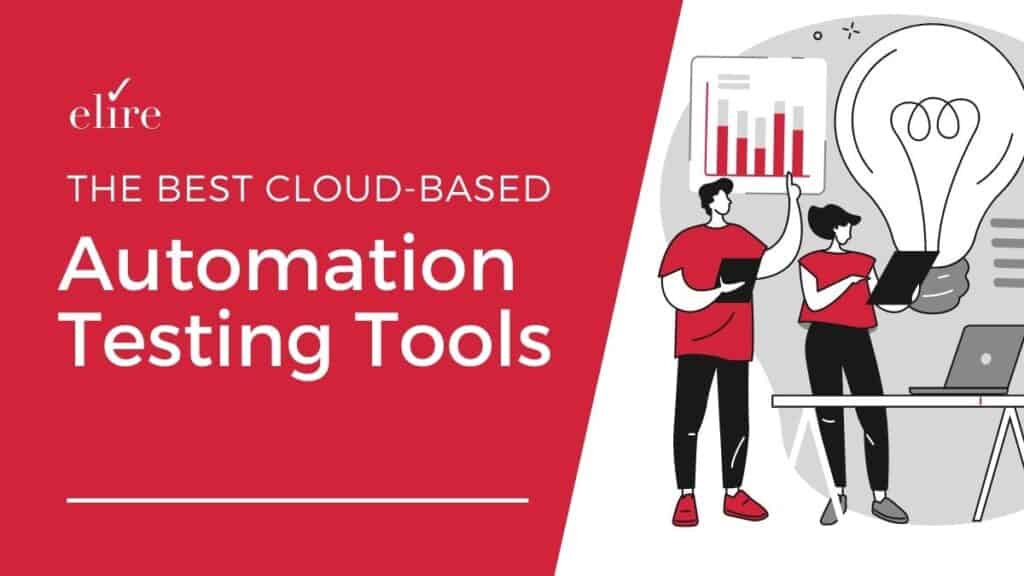
If automating your software testing process is something you’ve been considering, now is the time to take action. Today, the decision to automate your software testing is a no brainer. Especially if you’re expecting an increase in the volume of your testing and a decrease in the time you have to execute, automation can be the solution that grants your team the assurance of a stable and dependable system.
Due to the sometimes-tedious nature of software testing and the need for repeated testing during development cycles, any organization looking to create and launch new products will benefit from the time, money, and effort saved by automating your testing effort. Here, we’ll explore some of the key cloud testing tools available in the marketplace as well as the benefits of utilizing cloud-based testing tools.
Benefits of Cloud-Based Testing
The key advantage having your automated testing in a cloud environment is the speed with which automated testing can complete all the variations that are needed during a UNIT, SIT, UAT testing cycle. The user time is definitely a factor as well, as pulling dozens of people off normal operations to test during that window is difficult.
Cloud testing platforms are designed to run tests for multiple users, teams, and on multiple devices simultaneously meaning that testing and quality assurance teams are not required to share testing environments with other teams and projects. Cloud-based testing environments are worthwhile for their ability to accelerate your testing capabilities without sacrificing accuracy.
Another key benefit of cloud-based testing tools is their ability to rapidly test and restore configuration on any software updates and releases from 3rd party software you may be using. For organizations using Oracle Cloud applications, Oracle typically releases development update instances two weeks prior to go-live. Oracle Cloud users need to test any configurations, integrations, etc. during that two-week window. Though some upfront time and implementation effort is required, automation is critical to ensuring that updates reflect their intended functionality, in a timely manner.
Cloud Functional Automation Testing Tools
Of the cloud-based testing automation tools available in the marketplace today, you’ll find a variety of options ranging in cost and capability. A key advantage of cloud-based functional automated testing software is that there are many open-source tools available in the market that are available at no cost to license.
For those considering cloud testing but prohibited by cost, open-source solutions like Selenium allow for the ability to “dip your toe in the water” so to speak and experiment with cloud-based automated testing tools before committing to paid options.
If you’re already convinced of the benefits of having a cloud-based functional automation testing tool at your disposal and looking to invest in a paid tool, SmartBear, Katalon Studio, and Testsigma are some of the great paid options available. Most paid options will offer a trial period where potential users can try the tool out for free without committing to a long period of use.
Selenium
Currently, Selenium is the most popular open-source automation library and toolkit. Selenium is designed specifically to support automated testing of the functional elements in web-based applications, platforms, and browsers. As a widely used and available tool, Selenium is often the first tool we recommend looking into to help support your testing goals. Scripts can be written in a multitude of languages and allow automation against any web browser and most Web based applications. We typically recommend using Java or Python and an IDE like Eclipse to build scripts into.
TestComplete by SmartBear
TestComplete allows software testers to test the UI of every desktop, web, mobile, and packaged application available. This robust tool is leveraged by Elire in our testing cycles. It is highly scalable and allows users to extend test coverage where needed. TestComplete offers support to users from day one so that you’re able to implement your test automation tool quickly and efficiently. The tool leverages AI-powered object recognition and self-healing of tests and is easily integrated with other tools in the software development life cycle.
Calculating ROI
With any new tool implementation or endeavor, organizational leadership are always going to be focused on the bottom line. If you are considering a cloud-based testing solution but still on the fence, look to the ROI of having an automated tool in place.
For example, when building a script for time entry, you may have 20+ combinations of projects and tasks. Each testing cycle may take 3+ hours to run manual and highly thorough tests. If this is occurs three times per year, you’re looking at 9-10 hours total per year just for that singular test. This doesn’t include other testing that is routinely done.
With automated testing tools, you’ll need to tailor scripts to your configuration and data initially, a process that our consulting team will guide you through. Once that is complete, your testing will be fully automated your scripts will be built into end to end containers and you won’t need to spend time building test scripts from scratch or manually testing.
Beyond helping and advising our clients with automated testing, Elire has our own first-hand experience selecting a test automation tool. Explore Automated vs. Manual Testing here and reach out to [email protected] to set up a time to speak with automated testing team.
About the Expert:
Valentin Todorow has 12 years of PeopleSoft Technical and Functional experience and has completed over 80 Implementations of PTF in FSCM and HCM. He has built various integrations with other Test Management tools, Designed and Developed bolt-ons for PTF reporting, and headless execution.
Authors
-

Valentin Todorow has 16 years of PeopleSoft and Cloud Technical and Functional experience. He has built various solutions with Cloud and PeopleSoft Test Management tools, and serves as a Subject Matter Expert to clients and the PeopleSoft and Cloud community.
View all posts -

Ms. Caron serves as Elire's Marketing Manager, specializing in content strategy and digital media communications. Maddie works to deliver relevant industry updates and technical blog posts to educate and engage Elire's audience.
View all posts
